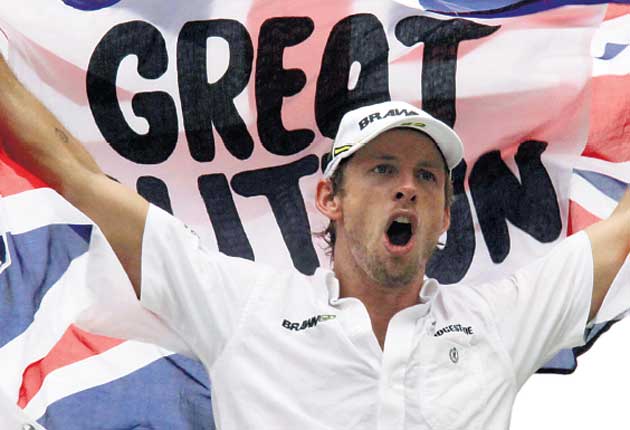Review of the Year 2009: Jenson Button
The boy wonder who left his critics trailing

There were more than the usual twists and turns to the 2009 Formula One season. Three major teams – Honda, BMW and Toyota – withdrew from the sport entirely. Renault's reputation came crashing down around the ears of managing director Flavio Briatore after news broke that Nelson Piquet Jr had been ordered to deliberately crash his car at the Singapore Grand Prix in 2008.
And on the track, it wasn't exactly a straight race to the finish line. A new team (Brawn GP) and a driver whose career looked to have stalled some years ago, stormed to the front, leaving established powerhouses such as Ferrari and McLaren reaching for the rule book to contest the legality of Jenson Button's car, and had the fans looking up the definition of what exactly a diffuser is.
As the stakes rose continually, the 29-year-old Briton found his almost casual domination of the first seven races suddenly deserting him for the remainder of a season in which the stress levels had never been so high. The manner in which he finally won through to claim the world championship, after several lacklustre races, prompted the inevitable questions: how much was down to his skill behind the wheel and how much was down to the cleverness of his vehicle, which had stolen a march on the opposition with a longer gestation period of its double diffuser technology? Button won two of the three opening races, finishing third in China as Sebastian Vettel and Mark Webber finished in first and second places for Red Bull, who would prove to be the Brawn team's biggest rival.
But even when the opposition caught up, Button went on to win the next four races, putting in a particularly brilliant qualifying performance in Monaco. His subsequent victory in the principality was as good a performance as anything we had seen there from the likes of Ayrton Senna or Michael Schumacher, and at the time swept away final doubts about his ability after years of floundering in mediocre machinery.
When Button had the right equipment he made the absolute best of it to build the points advantage that he would later live off when things became trickier. When the races in cooler climates came along, the Brawn car had a problem generating tyre temperature, because it was fundamentally gentler in the use of its rubber.
Suddenly, the British boy wonder lost his dominance. The role of Brawn pacesetter fell to team-mate Rubens Barrichello, whose coarser driving style generated better tyre temperatures. Button often failed to get the best from his car during qualifying, obliging himself to adopt a canny tactic of driving for points. His sudden inability to win – such a stark contrast to his start to the season – opened up the questions about his ultimate ability all over again.
In the end, he came through in Brazil, almost unexpectedly, after an appalling qualifying had left him only 14th on the grid, and suddenly he was home and dry with a race to spare.
"After Brazil, it was such an emotional moment that I was just knackered," he admitted. "I'd run out of steam because it was so stressful. Then you go through weeks of just waking up and not realising what you've achieved, other days you wake up and realise I've achieved my goal – I am world champion."
And then, astonishingly, he left Brawn to join Lewis Hamilton at McLaren, insisting that he needed the career change. "Everything has always been aimed at winning the world championship, and we achieved that goal," he said. "I'm very excited, but also very sad to leave a team that I've been with for seven years. But all good things come to an end, and we ended on a high."
So the scene is now set for an incredibly competitive 2010 season, with the first two consecutive English world champions in history partnered in a McLaren "dream team" and going up against Red Bull with Vettel and Webber, and Ferrari with Felipe Massa and Fernando Alonso. And since each driver is strong enough to hamper his partner by stealing points from him, it will favour the canny who can garner points at every race just as Button did this year.
And Silverstone, which signed a deal to run the British Grand Prix so late in the day, still has a chance to make 2010's event a major success – fans will have not one but two of their heroes to cheer for in competitive cars.
Join our commenting forum
Join thought-provoking conversations, follow other Independent readers and see their replies
Comments
Bookmark popover
Removed from bookmarks